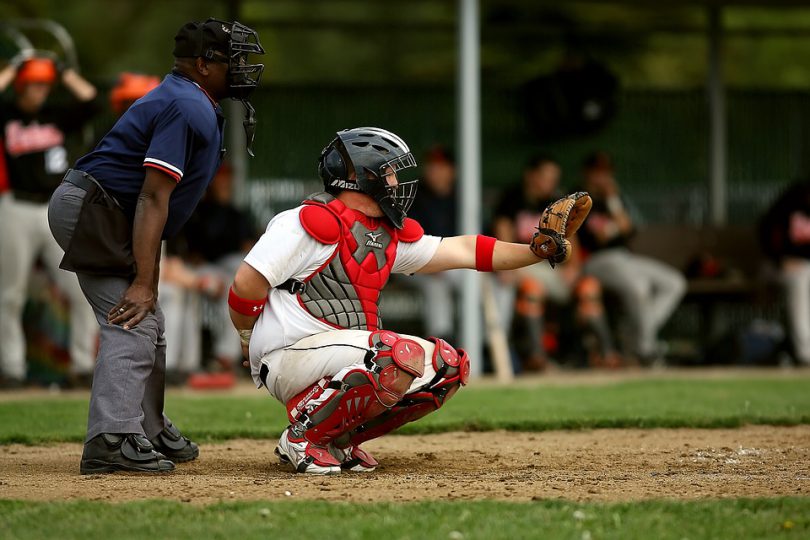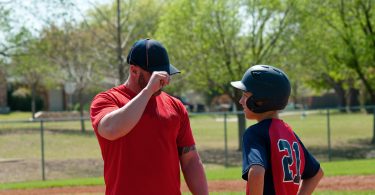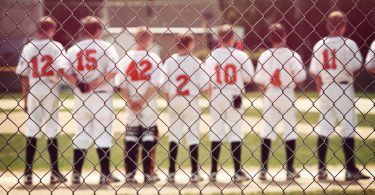In Part 1 of our ‘What is Projectability?’ mini-series, we defined projectability as an individual player’s forecasted future ability and room for growth. Put very simply, a prediction of how much better we think a player can be in the future. In this article, we want to discuss the ways that college coaches determine projectability and the different elements that make a player more or less projectable. While not all characteristics of projectability are things you can change, there are plenty of things you can do to make yourself a more projectable and recruitable player in the eyes of college coaches. Let’s take a look:
Physical Size: Think of physical size as the physical features you can’t control. Things like your frame, broadness of your shoulders, length of your arms, hand and foot size. In baseball, projectability favors bigger, longer, and more athletic body types. Coaches like to see a frame that can add mass and muscle, with powerful and long levers. Coaches will often look at your parents to help predict how your body may grow and mature over the college years. You can’t do much to change your physical size, but you can maximize what you put on your frame. Being in shape and taking care of your body will always help your projection, regardless of whether you are Jose Altuve or Aaron Judge.
Baseball Experience: Funny enough, having less baseball experience and less access to quality coaching actually makes you more projectable in the eyes of most coaches. If you have been juggling 3 sports your whole life and never devoted all your time to baseball, your inexperience works in your favor for projectability. If you can already display some of the requisite skills and athleticism without focusing on baseball, coaches will assume you can make greater strides in their program when the sport becomes your sole athletic focus. This is part of the reason why a lot of college coaches love recruiting multi-sport athletes. These players are seen as having the athletic background to make big gains when they put in extra time and get extra coaching on baseball.
Current Skill: The reason why current skill is important for projection is that it makes projectability less important. Remember our Chris Sale example from Part 1? Current skill tells a coach at what level you are ready to play right now and helps give coaches a safe estimate at predicting your “floor,” or the most conservative guess at your future ability. We were talking with an ACC pitching coach recently who said if a player is good enough to get the job done with what they have now, projectability doesn’t really matter. While no coach recruits a player thinking they won’t get better, if you are already throwing 95 with a wipeout breaking ball, it’s safe to assume you can pitch on just about any college baseball team, even if your projectability or room for growth is low. It goes without saying that you should always be working as hard as you can to develop into a better player. Being so good that your projectability becomes irrelevant should always be the goal.
Current Physical Maturity: This is different from your size. A high school senior who is 5’8” isn’t likely to turn into a 6’4” player. However, a skinny 5’8” high school senior with a baby face who has not yet physically matured projects much differently from a 5’8” high school senior with a full beard. Coaches and scouts will often look at facial hair to determine how physically mature a player might be and how much more growth can be expected. Deciding how much more physical maturity a player has to go is an important element of projectability. In general, it benefits you from a recruiting and projectability standpoint to look young, so keep those razor blades sharp and your face clean if you are worried about it.
Emotional Maturity: Emotional maturity is a double-edged sword. On one hand, an emotionally immature player who matures greatly increases their chances of becoming a much better player. Some coaches are willing to take that risk, thinking guys will “grow up”. On the other hand, emotional immaturity is often looked at as a trait that is not likely to change quickly. Some coaches simply will not roll the dice on a player who can’t keep his emotions in check. Emotional maturity also impacts some of the other variables for projectability. For example, an emotionally mature player who hasn’t physically matured and has a quality work ethic will likely be judged as being much more projectable than an emotionally immature player in the same situation. Emotional maturity is something you should strive for at all times because it is a characteristic sought by college coaches.
Mindset: You’ve heard us talk about the importance of mindset before. Like emotional maturity, having a mature, growth-oriented mindset will only help with projectability. It is one of the few things that you have ultimate control over and it is a variable that makes all your other assets more valuable. Simply put, players with a growth mindset are much more likely to succeed and develop as a player, so having that when you enter college bodes well for your future development.
Work Ethic/Drive: Every college coach believes that the system they have in place at their program will help players to get better. One of the biggest wild cards in recruiting is what type of work ethic and drive the player will have when they are immersed in the college environment. Work ethic and drive make up the engine of projectability. If a player isn’t willing to work to reach their full potential, they won’t. Coaches who believe a recruit has a poor work ethic will also believe that the player has poor projectability. All the potential in the world will not help you without the work ethic and drive to make it happen.
Athleticism: Athleticism is a crucial part of projectability because it is instrumental in making adjustments and gains as a player. The more athletic you are, the more coaches expect you to be able to handle their training system, and the more projectability they will assign to you. Athleticism will help carry a player through the ups and downs of the transition to college baseball. No matter what position you play, you will improve as a player if you become a more athletic player. Athleticism and functional strength need to be a focal point in your training regimen.
Coachability: Like work ethic, drive, and mindset, coachability is another wild card in the recruiting process. Players who aren’t willing to take instruction or can’t handle constructive criticism are less likely to develop and reach their ceiling. Demonstrating a lack of coachability is another trait that will have you crossed off just about every coach’s list in the country.
Applied Training: Coaches want guys that they feel project well within their program. There is little you can do to sway a coach’s mind if they don’t think you are a good fit in their system. All you can do is be the best version of yourself.
While you have more control over some of these aspects of projectability than others, just being aware of what coaches are using to evaluate and predict the type of college player you will become can and should help. Coaches want to get as much information about you as possible and fill in as many question marks as they can. Sometimes it is the smallest details that can make or break their decision to recruit you. To give yourself the best chance of being considered projectable and recruitable, make a plan that includes baseball skill development, strength and conditioning, getting good grades, and improving your mental game, emotional control, and mindset. If you constantly improve across these areas, there will be a college baseball fit for you.






